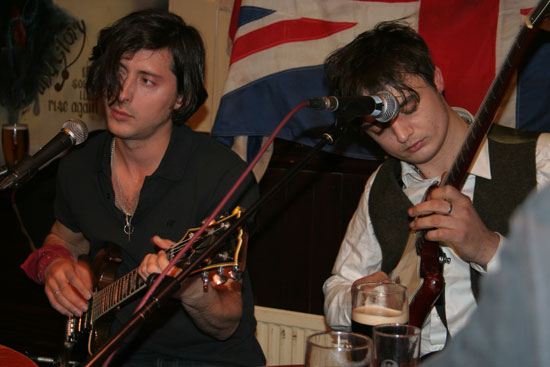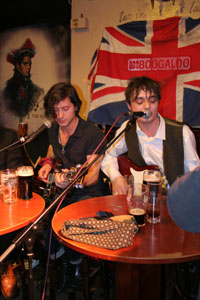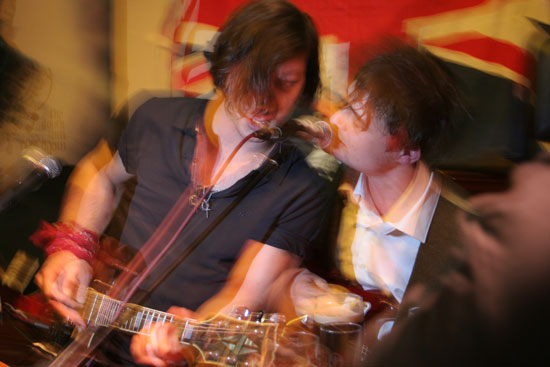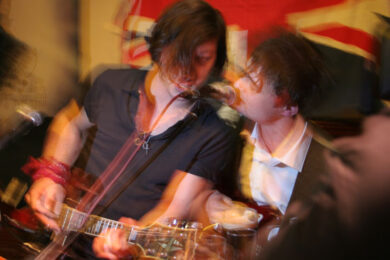It’s easy to be cynical about a band reunion, especially when the reunion itself appears to be an act of pure cynicism. Speaking of The Libertines reunion at the Reading and Leeds festivals, Pete Doherty said: “It’s hard to justify taking £150 of someone’s money and make them walk from one sponsored stage to another.”
But that’s exactly what The Libertines will be doing this summer. Making their fans walk from one sponsored stage to another, all in the name of the Good Ship Albion.
The Quietus stood outside the Boogaloo in Highgate for an hour as the music press and major news outlets waited for the Libertines to re-assemble for the first time since… quite a while after they were last relevant to anyone other than their core fanbase. Or the NME shoot on Tuesday. Exclusive.
Few are optimistic about the prospect of the boys in the band getting back together for the summer festivals. “If pushed to choose one thing that best embodies our callow, trifling attitude toward modern music I’d probably have to settle upon the ever decreasing time it takes bands to cash in on their own legacies,” writes Adam Smith at Totally Bone. Via email, the editor informs us that: “The Libertines are a cancerous growth on the cock of humanity. It is our job to gnaw it off and spit the bloody mess into the toilet bowl.”
Outside the venue, the gang of 40-year-old men you see in Camden boozers talking about the old days of Blur, with denim jackets and mop-tops, are counting their chips. This is their past, future and present come all in one afternoon, and they are reporting it for the nation’s major news outlets. “I saw them upstairs at the Barfly eight years ago,” reminisces one man in a suit and silk scarf. He works for the BBC.
Bass player John Hassall, grey hairs clearly visible, is first to arrive, and is teary-eyed throughout the press conference whose venue has been chosen to relive the glory of god-knows-when. A Union Jack adorns the stage. The Libertines reformed here once before, when people were more optimistic about the band’s prospects of stirring emotion.
Doherty and Barat arrive, with Barat sporting a military jacket and Doherty a tweed suit and acoustic guitar. In indie rock star time, which seems to elapse only in the heads of those who commit themselves to its myth, little has changed but the world around them. Once their antiquated language and romanticism were a beautiful relief from the torrent of the modern world, but now their love of yesteryear doesn’t retain any of its escapism or eccentricity. Blame that on side projects and tabloid exposure.

Amid a semi-circle of cameras and journalists, the fad four arrive. The Quietus gets its question in early on, before they’ve had time to settle in. What is it about the £1.5m appearance fee that made you reform for Reading and Leeds?
“£1.2 million,” Doherty corrects the rumours. “But whatever that amounts to after tax.” What about your legal fees? And Doherty looks in the crowd for his lawyer, who must accompany him everywhere he goes. And that’s as far as we get with our probing, with the circus being tightly stage-managed by their PR man.
The magic of The Libertines is directly opposed with the idea of them appearing, after months of negotiations, for a huge sum of money on a massive stage, two-times only. They used to play at the drop of a hat, in people’s living rooms and in their own house. Now they’re asking £1.2 million for two performances. Asked if there will be anything which gets near the kitchen sink approach for which they made their name, any smaller shows, Barat is pessimistic. “It’s in front of 100,000 people or never,” he says. It’s very different now, you see.
As the press conference wraps up and the four men retreat, we’re told to stick around because “something musical may happen.” Seeing as someone spent half an hour tuning guitars and testing microphones beforehand, it’s pretty obvious that “something musical” will happen, if that’s what they’re calling Pete Doherty’s performances nowadays.

And as they break in to ‘The Good Old Days’, it’s clear that something faintly musical is happening. The two men, Doherty, as white as a winding sheet, and Barat, who has aged only slightly, bring an acoustic and an electric guitar to life chirping. John Hassall is, by this point, struggling to hold back tears as he strums to their side. Drummer Gary Powell looks on empty-handed.
Despite the cynical motives, and despite however-many years, the songs hit even the crowd of sceptical press with a jet of hot water from some golden stream which began somewhere in 2002 with the release of Up The Bracket. Maybe it’s all the nostalgia sending everyone woozy, but maybe it sounds remarkably good. Maybe, just maybe, the nonsense surrounding their ‘reunion’ after six years is precisely that. Nonsense. The Stone Roses took five years between albums, and The Second Coming, no matter how bad, was never weighed down by being regarded as a ‘reunion’ effort. Yet, with only one more year than the Roses between their last album and their comeback, The Libertines are held to account by the dramatic terms by which they defined themselves; loyalty, glory, love, and redemption.
It’s not surprising then, that they when they burst back into the public eye, they do it with the volume with which they left, and using the same bold language. Drama is what they crave, and, despite all the cynicism, drama is what they manage to deliver.
As they spin through ‘Music When The Lights Go Out’, ‘The Good Old Days’, ‘Death On The Stairs’ and ‘Can’t Stand Me now’, it is impossible for The Quietus to retain its cynicism.
That’s not to say we will be looking forward to the Reading and Leeds appearances. In front of 100,000 people, the passion and intimacy will be lost in the airwaves. But in front of 100 people, for the first time in a while, The Libertines make good on their promises.



